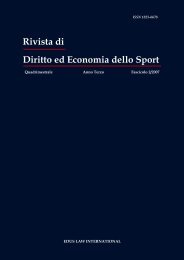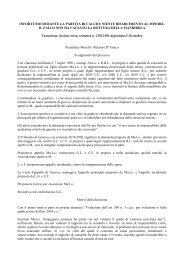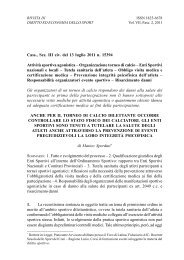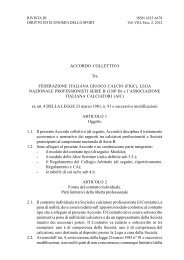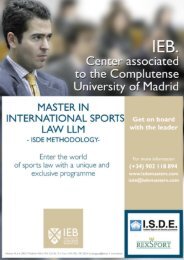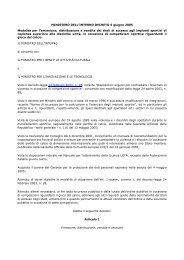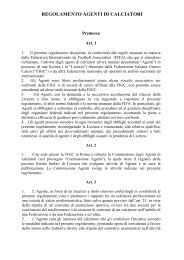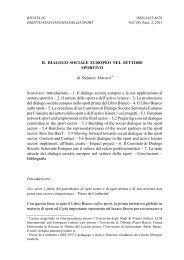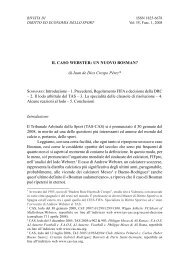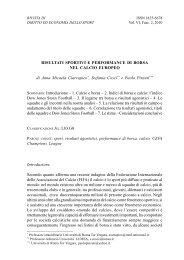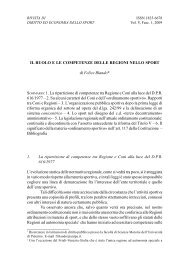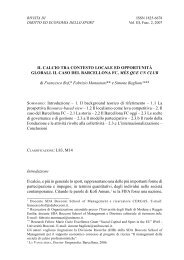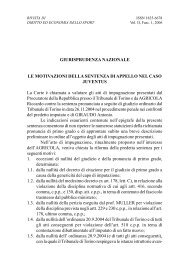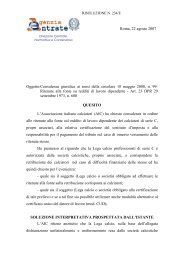European Sports Law and Policy Bulletin THE BERNARD ... - Slpc.eu
European Sports Law and Policy Bulletin THE BERNARD ... - Slpc.eu
European Sports Law and Policy Bulletin THE BERNARD ... - Slpc.eu
Create successful ePaper yourself
Turn your PDF publications into a flip-book with our unique Google optimized e-Paper software.
<strong>European</strong> <strong>Sports</strong> <strong>Law</strong> <strong>and</strong> <strong>Policy</strong> <strong>Bulletin</strong> 1/2010 - Chapter I 23Commission’s attitude by stating that the application in detail of the principles is amatter for FIFA to deal with <strong>and</strong> that the <strong>European</strong> Commission will see to it thatthe implementation of the «principles» will be effectively realised. 14On 5 July 2001 a new FIFA regulation concerning the status <strong>and</strong> transferof players, involving a training compensation system, was adopted. The FIFA ruleswere later modified, but the system has remained the same every since. Therefore,there was a lot of interest to know how the <strong>European</strong> Court of Justice wouldevaluate this new training compensation system under <strong>European</strong> Union law,especially in the context of free movement of workers. It must be pointed out thatthe Bernard case does not involve an explicit evaluation of the FIFA regulations.However, both the involved parties as well as the Advocate-General noted thefact that FIFA adopted new rules at the time of the proceedings. These rules, as isexplained in the Advocate-General’s opinion <strong>and</strong> by the submissions of the parties,governed situations such as that of Bernard but were not in force at the materialtime of the case.As they were adopted in order to seek compliance with the Court’s caselaw,in particular the judgment in Bosman <strong>and</strong> as the French Professional FootballCharter contained comparable rules for domestic situations, some parties requeststhe Court to give «its blessing to the rules currently in force». 15However, the Court did not evaluate the FIFA rules, but it seems obviousthat the reasoning of the Court in Bernard can, at least implicitly, be used toevaluate the existing FIFA rules.2.3 Underlying problemWhat is now the real issue in the Bosman <strong>and</strong> Bernard cases as far as trainingcompensation is concerned? The Bosman ruling considered the existing transferrules contrary to <strong>European</strong> Union law. The argument that this system was designedto address training efforts of clubs did not sufficiently convince the Court. However,the conflict between the FIFA rules <strong>and</strong> <strong>European</strong> Union law did not relate to thequestion whether the requirement to pay for training compensation would belegitimate. According to the Bosman ruling, training compensation is not, per se,unjustified. The question is, more precisely, under what conditions trainingcompensation would be compatible with the free movement of workers <strong>and</strong>, inlight thereof, how the fees for compensation should be calculated <strong>and</strong> payable.In the negotiations with the <strong>European</strong> Commission, mentioned above,training compensation was also accepted as a matter of principle. But the exchangeof letters of 5 March 2001 between the <strong>European</strong> Commission <strong>and</strong> FIFA did notgive any indication as regards the exact amounts (of training compensation) thatwould be payable in the new system. For example, FIFA pointed to a cap for____________________14Idem; Meeting of 13 March 2001.15Opinion of the AG Sharpston, Bernard, paras 60-61.



